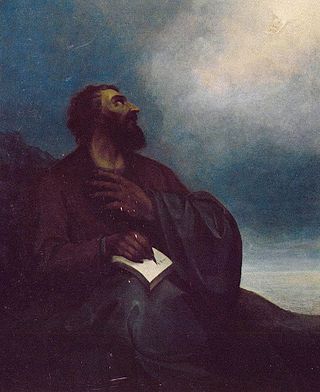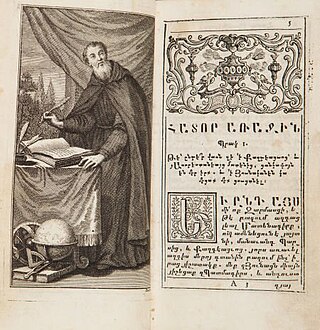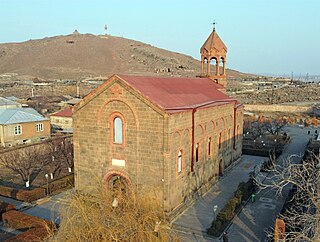

Thomas J. Samuelian is an American-Armenian linguist and author of a number of books and articles in the field of Armenian language, literature, and history. [1]


Thomas J. Samuelian is an American-Armenian linguist and author of a number of books and articles in the field of Armenian language, literature, and history. [1]
Samuelian earned his BA and MA at the University of Pennsylvania. In 1977, he was awarded a Beinecke Scholarship. [2] He earned a PhD in linguistics also from the University of Pennsylvania in 1978. [3] During the 1980s, Samuelian taught at the University of Pennsylvania, Columbia University and St. Nersess Armenian Seminary. [3]
In 1991, he earned a JD from Harvard Law School.
In 1998, he joined the faculty of the American University of Armenia where he later served as Dean of the LLM program and Dean of the College of Humanities & Social Sciences. He retired from the American University of Armenia in 2017. [4]
In 2006, he was awarded the Order of Saint Sahak and Saint Mesrop by Karekin II, Supreme Patriarch and Catholicos of All Armenians. [5]
He is a founder of the Arak-29 Foundation which promotes Armenian history, language and culture and frequently contributes translations and content to the site. [6]

The Armenian Apostolic Church is the national church of Armenia. Part of Oriental Orthodoxy, it is one of the most ancient Christian institutions. The Kingdom of Armenia was the first state in history to adopt Christianity as its official religion under the rule of King Tiridates III, of the Arsacid dynasty in the early 4th century.

Isaac or Sahak of Armenia was the catholicos of the Armenian Church from c. 387 until c. 438. He is sometimes known as Isaac the Great or Sahak the Parthian in reference to his father's Parthian origin. He was the last Armenian patriarch who was directly descended from Gregory the Illuminator, who converted the Kingdom of Armenia to Christianity in the early fourth century and became the first head of the Armenian Church. He supported Mesrop Mashtots in the creation of the Armenian alphabet and personally participated in the translation of the Bible into Armenian.

Mesrop Mashtots was an Armenian linguist, composer, theologian, statesman, and hymnologist in the Sasanian Empire. He is venerated as a saint in the Armenian Apostolic Church.

Grigor Narekatsi was an Armenian mystical and lyrical poet, monk, and theologian. He is venerated as a saint in the Armenian Apostolic and Catholic Churches and was declared a Doctor of the Church by Pope Francis in 2015.

Vardan Mamikonian was an Armenian military leader who led a rebellion against Sasanian Iran in 450–451. He was the head of the Mamikonian noble family and holder of the hereditary title of sparapet, the supreme commander of the Armenian armed forces. Vardan and most of his comrades died at the Battle of Avarayr in 451, but their sacrifice was immortalized in the works of the Armenian historians Yeghishe and Ghazar Parpetsi. He is regarded as a national hero among Armenians and venerated as a martyr and a saint of the Armenian Apostolic Church and the Armenian Catholic Church. Vardan and the rebellion he led are commemorated in numerous works of art and literature. According to Arshag Chobanian, "To the Armenian nation, Vartan [...] is the most beloved figure, the most sacred in their history, the symbolical hero who typifies the national spirit."

Koriun was a fifth-century Armenian author and translator. He was the youngest student of Mesrop Mashtots, the inventor of the Armenian alphabet. His sole known work is the Life of Mashtots, a biography of his teacher, which is the earliest known original work written in Armenian. The work gives information about Mashtots's invention of the Armenian alphabet, his preaching activities, and the efforts to translate the Bible and other Christian texts into Armenia, in which Koriun personally participated.

Armenian chant is the melismatic monophonic chant used in the liturgy of the Armenian Apostolic Church and the Armenian Catholic Church.

Eznik of Kolb was an Armenian Christian writer of the 5th century. He was one of the students of Mesrop Mashtots, the inventor of the Armenian alphabet. His only surviving work is an untitled treatise which refutes various religious and philosophical ideas. Scholars refer to this work as Refutation of the Sects or On God. Travelling to Edessa and Constantinople, Eznik participated in the translation of the Bible and other Christian literature from Greek and Syriac into Armenian. He is believed to be identical with a bishop of Bagrevand named Eznik.
The Leontine Martyrs were a group of nine Armenian clergymen who were who were killed after a long period of captivity in Persia in the 5th century AD. They were executed by the order of the Sasanian king Yazdegerd II in 455, five years after the insurrection led by Vardan Mamikonian. The group is named after Leontius of Vanand.

The History of Armenia, attributed to Movses Khorenatsi, is an early account of Armenia, covering the legendary origins of the Armenian people as well as Armenia's interaction with Sassanid, Byzantine and Arsacid empires down to the 5th century.
The University of Pennsylvania School of Arts and Sciences is the academic institution encompassing the humanities, social sciences, and natural sciences at the University of Pennsylvania.

Baghdasar Arzoumanian was an Armenian architect and designer based in Yerevan, Armenia. He designed a large body of civil and religious buildings as well as many smaller works.

Robert William Thomson was Calouste Gulbenkian Professor of Armenian Studies at Oxford University.

Vramshapuh was a noble of the Arsacid dynasty who served as the Sasanian client king of Armenia from 389 until his death in 414. He is mainly remembered for presiding over the creation of the Armenian alphabet by Mesrop Mashtots.

Movses Khorenatsi was a prominent Armenian historian from late antiquity and the author of the History of the Armenians.

Surp Hakob Church is located in the Kanaker-Zeytun District within the city limits of Yerevan, the capital of Armenia. Its sister-church, Surp Astvatsatsin, is located upon a hilltop to the northwest within sight of the Church of S. Hakob.

Saint Mesrop Mashtots Church is an Armenian Apostolic church in Oshakan that contains the grave of Mesrop Mashtots, the inventor of the Armenian alphabet. It is one of Armenia's better known churches and a pilgrimage site. Pilgrims visit the church on the Feast of the Holy Translators in October.

Fr. Mesrop Aramian is a priest of the Armenian Apostolic Church, theologian, scholar, writer, film producer, social entrepreneur and educator. Author of Ayb School's educational program and founding chairman of the board of trustees.He is a co-founder of the Ayb Educational Foundation. He is a co-founder and member of the Board of Trustees of the Foundation for Armenian Science and Technology (FAST.) Fr. Mesrop Aramian is a member of the AUAC Board of Trustees. Fr. Mesrop Aramian is the chief editor and founding director of "Gandzasar" Theological Center. He is the founder and director of "Vem Media Arts" and "Vem" Radio Station. He is the scriptwriter and producer of the documentary From Ararat to Zion, creative producer of the film The Book and the author of its idea. Fr. Mesrop has authored an Eastern Armenian translation of The Book of Lamentations by St. Gregory of Narek. He has also authored publications, articles, research studies, radio and TV shows, as well as educational projects and programs.

Ruben Mirzakhanyan is an Armenian political and educational figure, editor, Doctor of History, professor, RA Honoured Cultural Figure, and Rector of the Armenian State Pedagogical University after Khachatur Abovyan.
Hakob Sahak Hovakimyan, better known as Hrayr Hovakimyan, is an Armenian doctor and cardiac surgeon who was awarded the title of National Hero of Armenia.